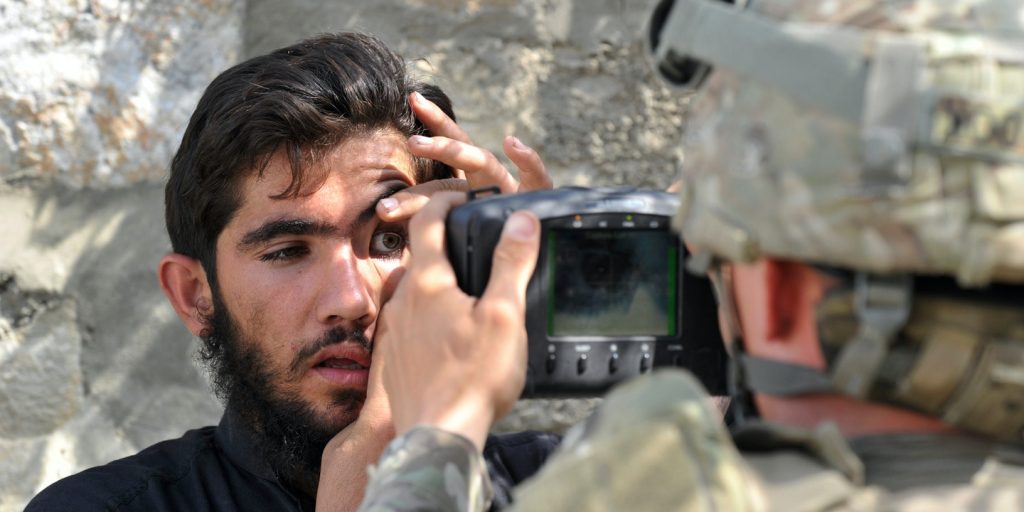
This may explain some of the chaos at airports in Kabul and across Afghanistan… The Taliban have HAVE seized U.S. military biometric collection devices that could aid in the identification of Afghans who assisted coalition forces.
The devices, known as HIIDE (Handheld Interagency Identity Detection Equipment) were seized last week during the Taliban’s offensive.
And now officials fear that sensitive data they contain could be used by the Taliban.
HIIDE devices contain identifying biometric data such as iris scans and fingerprints, as well as biographical information, and are used to access large centralized databases.
It’s unclear how much of the U.S. military’s biometric database on the Afghan population has been compromised.
While billed by the U.S. military as a means of tracking terrorists and other insurgents, biometric data on Afghans who assisted the U.S. was also widely collected and used in identification cards.
“We processed thousands of locals a day, had to ID, sweep for suicide vests, weapons, intel gathering, etc.” a U.S. military contractor explained. “HIIDE was used as a biometric ID tool to help ID locals working for the coalition.”
With these data, the Taliban will be able to identify collaborators. But how are they going to extract the information?
Pakistan will assist Taliban
An Army Special Operations veteran said it’s possible that the Taliban may need additional tools to process the HIIDE data but expressed concerns that Pakistan would assist with this. “The Taliban doesn’t have the gear to use the data but the ISI do,” the former Special Operations official said, referring to Pakistan’s spy agency, Inter-Services Intelligence. The ISI has been known to work closely with the Taliban.
The U.S. military has long used HIIDE devices in the global war on terror and used biometrics to help identify Osama bin Laden during the 2011 raid on his Pakistani hideout. According to investigative reporter Annie Jacobsen, the Pentagon had a goal to gather biometric data on 80 percent of the Afghan population to locate terrorists and criminals.
“I don’t think anyone ever thought about data privacy or what to do in the event the HIIDE system fell into the wrong hands,” said Welton Chang, chief technology officer for Human Rights First, himself a former Army intelligence officer. “Moving forward, the U.S. military and diplomatic apparatus should think carefully about whether to deploy these systems again in situations as tenuous as Afghanistan.”
This reminds me of the recent leak of a US watchlist with millions of names, including classified “no-fly” records.
The Defense Department has also sought to share the biometrics data collected by HIIDE with other government agencies such as the Federal Bureau of Investigation and Department of Homeland Security. In 2011, the Government Accountability Office criticized the Pentagon for not doing enough to ensure these other surveillance agencies had easy access to the information, warning that the military “limits its federal partners’ ability to identify potential criminals or terrorists.”
How secure is biometric technology?
But the U.S. didn’t only collect information about criminals and terrorists; the government appears to also have been collecting biometrics from Afghans assisting diplomatic efforts, in addition to those working with the military.
For example, a recent job posting by a State Department contractor sought to recruit a biometric technician with experience using HIIDE and other similar equipment to help vet personnel and enroll local Afghans seeking employment at U.S. embassies and consulates.
The federal government has collected biometric data from Afghans despite knowing the risks entailed by maintaining large databases of personal information, especially given recent cyberattacks on government agencies and private companies. These efforts are continuing to expand.
For example, a February 2020 article published by the Army indicated that the service was modernizing its 20-year-old biometric processing technology and had saved more than 1 million entries in the Pentagon’s Automated Biometrics Identification System, or ABIS, which hosts HIIDE and data collected by other devices as well.
“This updated database will make it more efficient for warfighters to collect, identify and neutralize the enemy,” wrote Col. Senodja Sundiata-Walker, project manager for the Pentagon’s biometrics program.
President Joe Biden’s proposed budget for the Army in fiscal year 2022 seeks more than $11 million to purchase 95 new biometric collection devices expanding upon those used in Afghanistan and Iraq. [Intercept, Privacy International]
Now subscribe to this blog to get more amazing news curated just for you right in your inbox on a daily basis (here an example of our new newsletter).
You can also follow us on Facebook and/ or Twitter. And, by the way you can also make a donation through Paypal. Thank you!
You should really subscribe to QFiles. You will get very interesting information about strange events around the world.














This is what we gave them . We scared of 100k togs of Afghani and leader was in prison in Guantanamo bay. Like COVID we created it and given mission to give him red carpets. Now they own all USA military with guns helicopters and ammo and much more. This is was pre planned and Global elite are ready to dis mental all world like Iran and Afghanistan.
It is crazy 250K of Army of Afghanistan diminished from ISIS/Taliban buggy mans? They did not stood for their countries . 4 Afghanistan F16 pilots were captured by terrorist Talibans made in USA and British.
They were executed from the roof . Said there is no room for lady become a poi lots here now Islam rules. US calls on Iran to halt ‘nuclear escalations’
UN nuclear agency reports Iranian progress on uranium metal production as the US warns Tehran is threatening nuclear deal talks.
Iran has made progress in its work on enriched uranium metal, the UN nuclear watchdog said in a report to member states, despite Western warnings that such work threatens talks on reviving the Iran nuclear deal.
The United States responded to the report by demanding that Tehran halt its “nuclear escalations”.
Iran’s work on enriched uranium metal has angered Europe’s three top powers and the US because that technology – and knowledge of how to produce it – can be used to make the core of a nuclear weapon. Iran insists its aims are entirely peaceful and it is developing a new type of reactor fuel.
“Iran has no credible need to produce uranium metal, which has direct relevance to nuclear weapons development,” US State Department spokesperson Ned Price said in a statement.
“Iran should cease its nuclear escalations and return to negotiations toward full implementation” of the nuclear agreement, he said.
In the report issued by the International Atomic Energy Agency (IAEA), Director-General Rafael Mariano Grossi said his inspectors confirmed on Saturday that Iran had now produced 200 grammes of uranium metal enriched up to 20 percent.
Grossi previously reported in February that his inspectors had confirmed that a small amount of uranium metal, 3.6 grammes, had been produced at Iran’s Isfahan plant.
Iran promised not to produce uranium metal as part of the 2015 Joint Comprehensive Plan of Action (JCPOA), under which it was to scale back its nuclear program drastically in return for sanctions relief.
Fifth Wave in Iran lock down. Iran announces 6-day lockdown amid surge in COVID cases
Anger continues to mount over how the pandemic has been handled in Iran as vaccination efforts progress slowly.Tehran, Iran – As Iranians are angry and frustrated with the country’s COVID-19 response, the government has announced a six-day country-wide shutdown to curb an alarming rise in deaths and infections.
The national anti-coronavirus task force, led by President Ebrahim Raisi, said on Saturday the nationwide shutdown will begin on Monday and last through Saturday. All offices, banks and non-essential businesses will be shut down.
An intra-city travel ban will also be instated from Sunday morning and last through Saturday night.
This is while earlier this month, Health Minister Saeed Namaki called for an urgent two-week lockdown enforced by the military to prevent a full collapse of the country’s strained health system.
Several earlier lockdowns were easily flouted amid lax enforcement by authorities.
It remains to be seen whether this new effort will have a meaningful effect on curbing the deadliest pandemic of the Middle East, now in its fifth wave defined by the Delta variant.
Islam lies and Islam is Nagis lol…
You are not American.You gave them nothing. People named Mohamed should all be deported out of the West. Sooner or later you will be.
Once the redchineseys take over in Afghanistan, there will be slave labor camps with all Moslems and Christians worked to death, raped, tortured, organ harvested, and other abominations.
Nice. Turns out all the Afghans who were working with the U.S. embassy are subject to reprisals from talibani. All their address, phone, and personal data was NOT destroyed when dickweed PedoBiden abandoned the embassy like a fricken coward. Then he went an hid like a coward as did his skank-ho vp.
What a disgrace!
redchineseys are over there now working with talibani, to further disgrace America!
Oh no! Now they are going to reverse engineer them and make thousands of them. Then they are going to build a data base of every Afghani’s bio markers with their super computers. Probably even go so far as to have chips implanted in them to track their every action… Oh wait.
Way to go Presaident Rigor Mortis!
AND 10-40,00 American Citizens are being left behind by Milley and Biden.